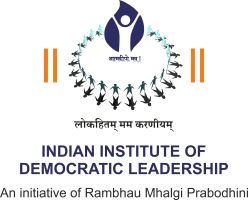India is going through interesting times. We are in the age of aspirations and yearning for better life is everywhere. The responsibility to meet these popular aspirations rests on all who lead the people. Leaders belonging to multiple sectors, especially from politics, media and voluntary organisations play a key role in both, shaping aspirations and creating a climate where these aspirations are successfully fulfilled.
While born leaders are always in short supply, there is also an acute dearth of individuals who try acquiring leadership skills within themselves and thereby prepare themselves to play the role of a leader very convincingly. This is because, many beloved that like instant coffee, there is also instant leadership. True, leadership requires initiative, courage and presentability. However, for an authentic leadership initiate must come out of inspiration, conviction has to be the base of courage and principles must precede presentability.
Here comes the role of Rambhau Mhalgi Prabodhini’s leadership school named as Indian Institute of Democratic Leadership (IIDL). For the last eight years IIDL has been striving to create leaders who would provide able leadership to the country at large than just indulging in netagiri.
Fortunately, today the democratic process has become much more engaging and participative than ever. The youth are more aware of their rights and duties. The youth aspire to play a proactive role in the process of democracy. At the same time, the government and the polity needs young talent equipped with the right ideas and competencies to keep pace with the changing times.
IIDL’s Post Graduate Programme (PGP) in Leadership, Politics and Governance is a unique inter disciplinary course designed to close the gap between young talent and India’s democratic polity and governance.
The programme is targeted at students and young professionals who wish to make a career in public affairs in general and in democratic politics, policy driven governance, and multi-dimensional leadership in particular. The PGP is designed to produce trained, ethical and responsible leaders. In short, in short- “New Leaders for a New India.”










